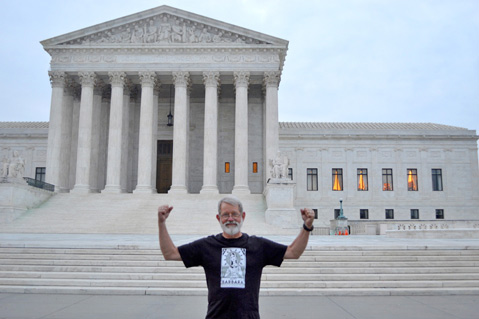Mr. Apel Goes to Washington
Supreme Court Skeptical About Free Speech at Vandenberg Air Force Base

John Dennis Apel estimates he’s appeared in front of a judge about 20 times in as many years, so being in court is almost old hat for the veteran Catholic Worker peace activist from Guadalupe. But last week, Apel acknowledged he was more than a little nervous about appearing in front of all nine judges making up the U.S. Supreme Court as part of a legal showdown pitting his free speech rights against the property rights of the military commanders at the Vandenberg Air Force Base. Unfortunately for Apel, it turned out many of the justices were much more focused on property rights and impatient with attempts by his attorney, Erwin Chemerinsky, to keep raising the free speech issue. “You keep sliding into the First Amendment issue,” said Justice Antonin Scalia, scolding Chemerinsky. “You can raise it, but we don’t have to listen to it.”
If Scalia seemed grumpy, there was reason. The case had been brought before the Supreme Court by the U.S. Government in response to a Ninth Circuit Court ruling that overturned Apel’s conviction of trespassing in front of Vandenberg Air Force Base against the Iraq War two years ago. The Ninth Circuit opinion was rooted in a technical interpretation of property rights that base commanders worry will limit their ability to defend U.S. military installations. The justices agreed to take the case to address only that narrow issue.
Government attorneys noted that Apel had been arrested for vandalism — spraying the VAFB gate with his own blood in 2003 — for which he’d been barred even from the area designated for just such protests. That he did so anyway, they said, constituted a Class B misdemeanor offense. Apel countered his conviction was unconstitutional because although he was protesting on base property, it was 200 yards outside the military installation and on a public road with no access restrictions and in the “free speech zone” created by Vandenberg commanders in the late 1980s. Because the road in question was not owned exclusively by the military — it shares an easement with the County of Santa Barbara — Apel and Chemerinsky argued base commanders lacked the authority to determine where anyone could protest, let alone charge him with trespassing. Ultimately, the Ninth Circuit ruled in Apel’s favor, basing its ruling on the fact that the base did not enjoy exclusive ownership of the road.
Government attorneys objected, insisting the base commanders should enjoy the last word over what happens on any base property as a matter of national security regardless of where the fence might be. The fact that they allowed motorists the use of the roads and created the free speech zone, they added, was a privilege — “a grace,” the justices called it — the commanders afforded protestors, not a right. That this prerogative could be challenged because of something so flimsy as a shared easement, they argued, was fraught with implications nothing less than absurd. By the same logic, they demanded, why couldn’t demonstrators protest at will on utility company easements, as well? This question appeared to give serious pause to at least four justices, who peppered Chemerinsky with numerous questions on this point. Apel himself would later dismiss this concern as “a hypothetical doomsday scenario,” adding, “A utility easement is not a public forum the same way a road is. It’s not a place where people can go 24/7 without restraint.”
Not all the questions were hostile to Apel’s case, however. Justice Sonia Sotomayor noted that two public schools as well as a public highway operate on VAFB property and wondered, “How you can keep a person off of land that the military is not using in its operations?” Sotomayor later appeared to take issue with the government’s decision to bar Apel because of his misdemeanor conviction. “It seems such an odd thing for a Class B misdemeanor to be used to protect the national security,” she said.
While Apel said he was disappointed by “the trajectory” of the questions, he said he was bothered that the justices frequently interrupted Chemerinsky as he sought to answer their questions. Apel also complained that Justices Clarence Thomas and Scalia would lean back in their chairs, sharing some private jokes while his case was being argued. Apel said he brought his wife and two teenage children for the occasion, but he lamented the “lack of attentiveness by some of the justices.”
Chemerinsky took all that in stride and cautioned against reading too much into the questions. Even if the court finds the Ninth Circuit erred about easements and exclusivity, Chemerinsky said, the court could still remand the free speech issues to lower courts to address. And on those, Chemerinsky said, a 1972 case offered strong and clear precedent. The court has to rule within three months, but it could decide sooner



